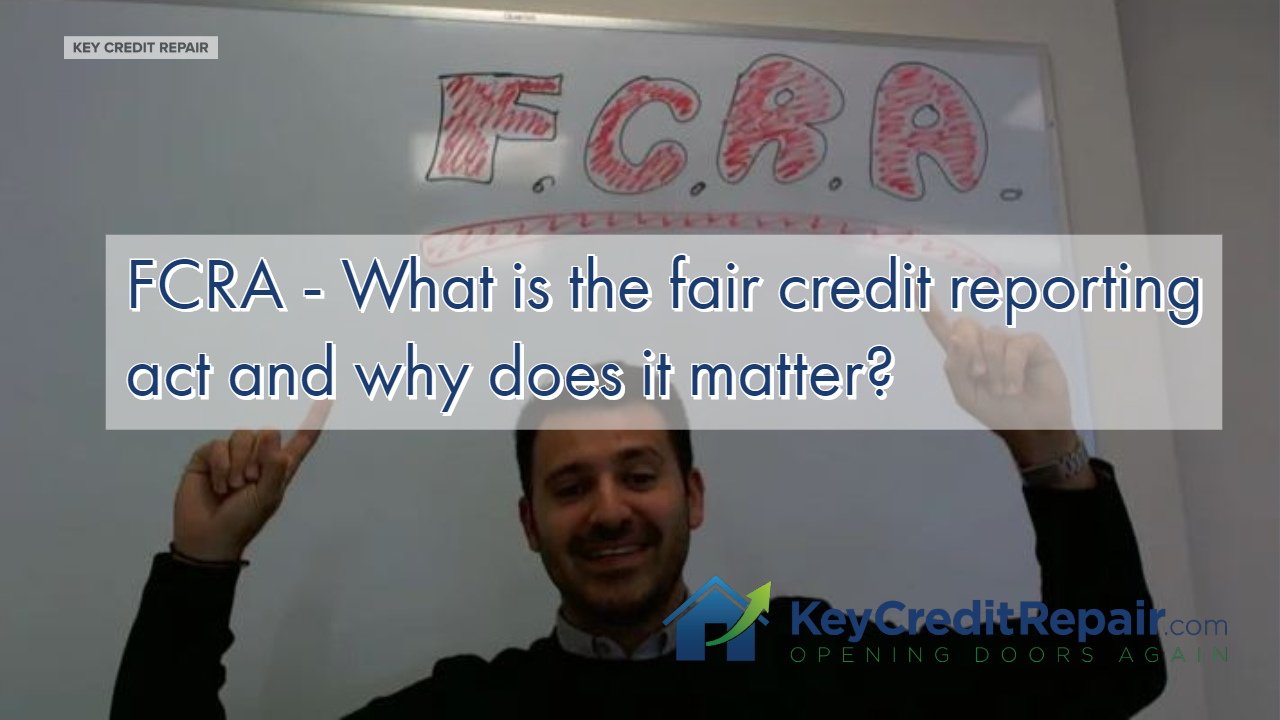FCRA – What is the fair credit reporting act and why does it matter?
Your Credit Minute Show Notes:
- 00:00 What’s up, YouTubers? This is Nik Tsoukales with Key Credit Repair, and today we’re gonna talk about one of my favorite things in the world; FCRA.
- 00:08 FCRA, FCRA, FCRA. We talk about FCRA a lot here at Key Credit Repair, and if you’re wondering what FCRA, well, let me introduce you to, let me introduce to FCRA. We got the Fair Credit Reporting Act.
- 00:23 This is the fuel. This is what allows us to repair credit. This is what allows you to challenge things on your credit report. This is something that sets the United States apart from, um, really from everyone. There’s a reason why our system is set up in a way where we get a restart button, we can protect ourselves. Um, we have the Fair Credit Reporting Act. Okay.
- 00:43 There’s a reason why credit repair’s so prevalent in the United States, you can challenge things because we have rights enacted by Congress that allow us to challenge something negative on a credit report.
- 00:52 So, I’m gonna give you just some basic facts, but then I’m gonna talk about why this is super beneficial.
- 01:00 So, if you can read my bad handwriting here as always, ah, the Fair Credit Reporting Act, enacted by Congress in 1970. Okay.
- 01:05 And these are some of your basic rights. You have the right to know. You have the right to know what’s on your credit report. Okay. Um, someone can’t mask that information, they can’t hide it from you. If they’ve used that data to make a credit decision and you’ve been declined, they have to share that with you.
- 01:21 Okay. You have the right to a credit score. So, if you’ve been recently declined for something you probably got the letter in the mail referencing the Fair Credit Reporting Act and giving you a credit score, and also a range of credit scores depending on the type of credit score that’s used. They have to give that to you by law. Okay.
- 01:36 Then you have the big one, a right to dispute. Anything inaccurate, incomplete, unverifiable or really just questionable, you have the right to challenge on the credit report. So, it doesn’t need to stay there because it was placed there, otherwise I’d be out of a day job, right guys?
- 01:53 Um, also, last but not least, the right to legal action. So, if you send a dispute letter off to the credit agencies and you’re challenging something that’s just obviously inaccurate and they refuse to remove it or properly investigate it, you have the right to legal action. You have the right to take these guys to court, you have the right, um, to get paid, ah, to get, to get paid for damages. Okay. So, keep that in mind.
- 02:16 This is the leverage that you have when you’re doing credit repair. Okay.
- 02:20 Also, the FCRA is, um, something that is, um, administered and monitored by the Federal Trade Commission. Okay. So, we have a government agency that oversees this. You also have the Consumer Financial Protection Bureau that’s heavily involved in making sure that no one violates the FCRA anymore. Um, and also you have advocacy groups like Key Credit Repair and other credit repair companies that can help you challenge things that could be an obvious violation of the Fair Credit Reporting Act.
- 02:45 Now, keep in mind there’s gonna be a follow-up video to this explaining FDCPA, another fancy acronym we use here a lot, which is the Fair Debt Collections Practices Act. So, for those of you with that, that’s gonna be the acronym that you wanna follow, especially if it’s questionable debt.
- 03:01 The Fair Credit Reporting Act is quite clear. Also keep in mind with the FCRA, something to think about is, you know, you have the right to challenge these things but it doesn’t have to be vague. Okay. And when I say vague it means we have some clear guidelines for how long these companies have to respond.
- 03:19 So, when you send out a dispute letter, you’ll probably hear the rule of thumb that we have 30 days, we have 30 days for an investigation. Where does this 30 days come from? Well, it’s actually in the Fair Credit Reporting Act. Okay.
- 03:33 I’m gonna supply the link for you guys, um, to Wikipedia, okay, where you can actually see a history of the Fair Credit Reporting Act, see why it was created and why. Okay, you can see some of the furnisher information, um, some of the uses of consumer credit reports, of permissible purposes as well. Okay. So, someone just can’t pull a credit report because, ah, they want to. They have to have permissible purpose.
- 03:54 So, I’m gonna list that out for you, as well as giving you a link for a free PDF download at, um, keycreditrepair.com/credit-laws. Okay. You can actually download a full PDF version of the Fair Credit Reporting Act. Especially for you, for those do-it-yourselfers, if you wanna get some ammunition when you’re, when you’re creating those letters, you can get them right there.
- 04:16 Thanks guys. This is Nik Tsoukales with Key Credit Repair. Have a great day.
Important Links: FCRA download & FCRA Wikipedia

